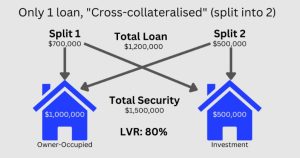Jumbo Mortgage Cross Collateral Mortgage Lenders
The cross-collateral program allows for 90% financing of the eligible property value when ELTV is 5% below published LTV with a maximum of 65% LTV, and, in certain cases (see below), an allowance for the borrower to elect not to make a down payment.

Generally, the minimum cash down payment required is as follows:
• 10% cash down required for owner-occupied cross-collateral properties
• 20% cash down required for second home or investment cross-collateral properties
100% financing may be available if the following three conditions are met:
• Purchase transactions ONLY
• Effective LTV that is AT LEAST 15% below the published threshold for the transaction
• 12 months’ all mortgage payments held in liquid reserves
• No gift funds are part of the transaction
Effective LTV is calculated by dividing the loan amount by the total, summed value of both cross-collateral properties.
Example: Owner Occupied Property
Property A Lesser of Purchase Price or Appraised Value $2,000,000
Property B Appraised Value $ 770,000
TOTAL VALUE $2,770,000
90% of Purchase Price Property A $1,800,000
Loan Amount Requested $1,800,000
Cash Required $ 200,000
Effective LTV 64.98%
Other Cross Collateral Requirements:
• Primary residences, second homes, and investment cross-collateral properties may be crossed with the subject;
o NOTE: cross collateral properties located in Washington DC, West Virginia, and Virginia and Texas Homestead/Texas Home Equity may not be used for a cross.
• The second piece of real estate must be owned by the borrower;
• Florida cross-collateral mortgage lenders should be in the first lien position on both cross-collateral properties (deviations from the guideline are allowed if there is an abundance of equity). These deviations must be reasonable and well-documented;
• An appraisal report will be required for both cross-collateral properties as follows:
o Loan amount $1,000,000 or less – one appraisal is required for the subject property and one for the cross-property.
o Loan amounts between $1,000,000 and $1,500,000 – If the subject property appraisal is ordered through a Florida cross collateral mortgage lenders-approved AMC, then only one full appraisal is required. Otherwise, two full appraisal Reports are required. One for the cross-property.
o For loan amounts over $1.5 million: two reports for the subject property and one for the cross-property.
• A preliminary title report is required with the lender’s coverage on both cross collateral properties;
• Proof of hazard insurance for both cross-collateral properties.
• Proof of flood insurance for both cross collateral properties (if applicable).
• Property taxes due within 60 days must be paid current on both cross collateral properties.
• 2 recording fees if cross collateral properties are located in different counties.
• One note and one mortgage will be executed and will be recorded against both cross-collateral properties for the total loan amount (unless the cross-collateral properties are in different counties in which case 2 mortgages will be recorded – 2 recording fees)
More Florida Mortgage Options Include:
We provide a variety of specialty Alternative Florida mortgage programs including:
- No Income: No doc, stated Florida no Income verification Mortgage Lender
- NO tax return: Non-QM and private lenders offer alternative documentation.
- NO Income:: Use the subject property’s income for your next investment.
- Foreign National: Nonresidents can invest purchase or cash out.
- Commercial: Options for Florida office buildings, shopping centers, and warehouses.
- Reverse Mortgage Condo: 55+ Florida Condo mortgages with no monthly payments.
- Bad Credit: Bad Credit mortgage approvals based on payment history.
- Non-warrantable Florida Condos – that don’t meet Fannie Mae or Freddie Mac specifications.
- Condotel Mortgage Options – unit owners can rent out their units to short-term guests
- Cross Collateral – qualify up to 90% financing when pledging more than one property for collateral.
- 1099 Only: Use 1099 use Income up to 100% deposits if you don’t have any business expenses.
- VOE: Allow your VOE to disregard your tax return write-offs.
- Bank Statement: Use 12 or 24 average bank deposits for mortgage income.
- Asset-Based: Assets in your account to qualify.
- Self-Employed Mortgage: – If you write off too much of your income.
- P&L Only:: Use Your licensed Tax preparer Profit and Loss to qualify.



